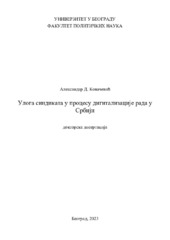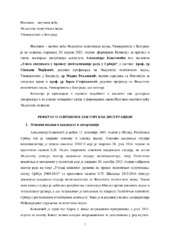Приказ основних података о дисертацији
Улога синдиката у процесу дигитализације рада у Србији
ǂThe ǂrole of the trade unions in process of digitalization of labour in Serbia
| dc.contributor.advisor | Stojiljković, Zoran | |
| dc.contributor.other | Đorđević, Snežana | |
| dc.contributor.other | Reljanović, Mario | |
| dc.creator | Kovačević, Aleksandar D. | |
| dc.date.accessioned | 2023-11-28T17:19:56Z | |
| dc.date.available | 2023-11-28T17:19:56Z | |
| dc.date.issued | 2023-08-30 | |
| dc.identifier.uri | https://eteze.bg.ac.rs/application/showtheses?thesesId=9370 | |
| dc.identifier.uri | https://fedorabg.bg.ac.rs/fedora/get/o:31817/bdef:Content/download | |
| dc.identifier.uri | https://plus.cobiss.net/cobiss/sr/sr/bib/131148553 | |
| dc.identifier.uri | https://nardus.mpn.gov.rs/handle/123456789/21912 | |
| dc.description.abstract | Дигитална револуција доводи до радикалних промена у сфери рада и настанка нових облика рада који се заснивају на употреби дигиталних алата. Она доводи до настанка ултрафлексибилног дигиталног тржишта рада чиме се унижавају права радника, али истовремено и буди интересовање синдиката који прилагођавају своје деловање условима дигитализације. Основно истраживачко питање гласи: на који начин се могу променити стратегије синдикалног деловање како би се побољшала улога синдиката у заштити права радника у процесу дигитализације? Основни циљ овог рада је објашњење улоге синдиката у процесу дигитализације рада у Србији. У раду се користе све основне методе, док се од општенаучних користе: хипотетичко-дедуктивна, статистичка, компаративна и метода моделовања. Ради прибављања података се користи анализа садржаја, испитивање, посматрање, интервју и метод студије случаја. На почетку рада се приступа детаљној објашњавању појмова синдикат, социјални дијалог и дигитализација рада и објашњавања дигитално тржишта рада. На крају првог дела рада се представљају платформе за деловање синдиката у ери дигитализације. У наставку рада се проблематизује случај Србије и објашњава процес дигитализације рада у условима неолибералне парадигме економских односа и наглашава експанзија гиг економије, дигиталног тржишта рада и рада на дигиталним платформама. Суштину рада чини емпиријско истраживање о положају дигиталних радника у Србији и студије случаја платформе Upwork и апликације Car: Go. У закључним разматрањима се истиче посебна улога традиционалних синдиката који треба да креирају лепезасту стратегију деловања како би у свој опсег обухватили дигиталне раднике који представљају нову синдикалну клијентелу, а да притом не наруше већ стечена права традиционалних радника | sr |
| dc.description.abstract | The digital revolution causes radical changes in the workplace and the creation of new types of labour that rely on digital instruments. It leads to the formation of an ultra-flexible digital labour market, which reduces workers' rights while piquing the attention of trade unions, which adapt their operations to the conditions of digitalization. The major research question is: how can trade union strategies be modified to improve their role in preserving workers' rights during the digitization process? The main objective of this research is to discuss the role of labour unions in Serbia's digitization of work. The study employs all basic methods, as well as general scientific methods such as hypothetical-deductive, statistical, comparative, and modelling approaches. Content analysis, surveys, observation, interviewing, and the case study technique are employed to gather data. A full description of the terms trade union, social dialogue, digitization of work, and digital labour market is provided at the start of the paper. The platforms for trade union action in the digital age are provided towards the conclusion of the first part of the text. In the next section, the situation of Serbia is problematized, the process of labour digitalization is discussed in the context of the neoliberal economic relations paradigm, and the rise of the gig economy, the digital labour market, and work on digital platforms are highlighted. The paper's main focus is empirical research on the condition of digital workers in Serbia, as well as case studies of the Upwork platform and the Car: Go application. The specific role of traditional trade unions is stressed in the final remarks, which should develop a multi-objective strategy for incorporating digital employees, who constitute a new trade union clientele, without infringing on traditional workers' already acquired rights. | en |
| dc.format | application/pdf | |
| dc.language | sr | |
| dc.publisher | Универзитет у Београду, Факултет политичких наука | sr |
| dc.rights | openAccess | en |
| dc.rights.uri | https://creativecommons.org/licenses/by-nc-nd/4.0/ | |
| dc.source | Универзитет у Београду | sr |
| dc.subject | четврта индустријска револуција, дигитализација, дигитално тржиште рада, дигиталне платформе, гиг економија, Upwork, Car: Go, лепезаста синдикална стратегија | sr |
| dc.subject | fourth industrial revolution, digitization, digital labour market, digital platforms, gig economy, Upwork, Car: Go, multi-objective strategy | en |
| dc.title | Улога синдиката у процесу дигитализације рада у Србији | sr |
| dc.title.alternative | ǂThe ǂrole of the trade unions in process of digitalization of labour in Serbia | en |
| dc.type | doctoralThesis | |
| dc.rights.license | BY-NC-ND | |
| dc.identifier.fulltext | http://nardus.mpn.gov.rs/bitstream/id/157208/Disertacija_14451.pdf | |
| dc.identifier.fulltext | http://nardus.mpn.gov.rs/bitstream/id/157209/Izvestaj_Komisije_14451.pdf | |
| dc.identifier.rcub | https://hdl.handle.net/21.15107/rcub_nardus_21912 |



